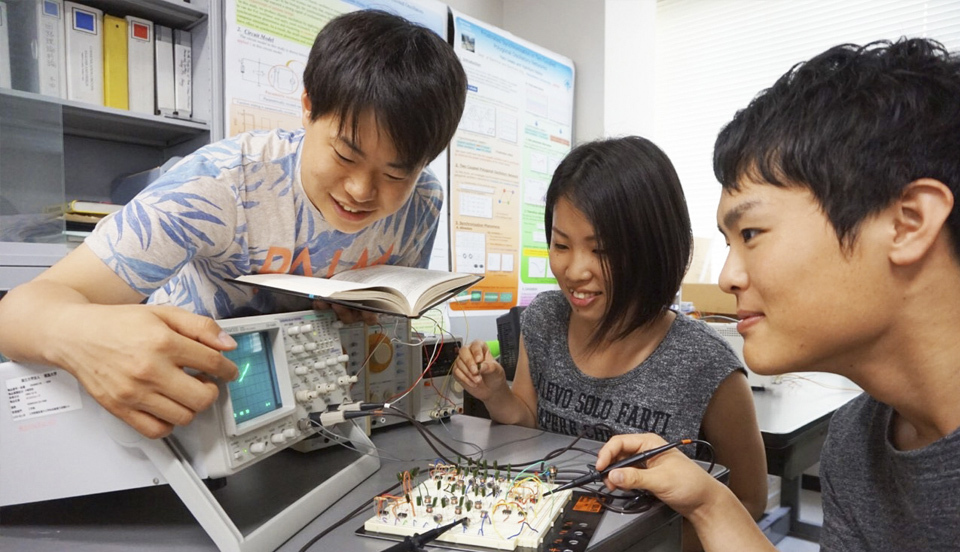
About this department
Electricity is being used in all areas of highly-sophisticated information societies, such as mobile phones, computer systems, home appliances, motor vehicles, aircraft, office equipment, and manufacturing equipment. The use of electricity varies with the purpose of use. For example, electricity is used as control signals, radio waves that transmit information, light sources, and energy sources.The course of Electrical and Electronic Engineering provides education and research on state-of-the-art specialized fields of advanced technologies used in electricity, electronic devices, semiconductor lasers, electric energy, robots, electric cars, clean energy, automatic control, communication systems, medical electronic equipment, biological information processing, electronics, computer systems, and software development.
Unique
The Electrical and Electronic Engineering Course plays a central role in the recent innovation of electricity-related science and technology. For the purpose of efficiently learning a wide range of electrical and electronic disciplines, this course consists of four major education and research groups: Materials Science and Device, Electric Energy Engineering, Communications and Controls, and Intelligent Networks and Computer Sciences. In the 1st year of the course, the students study the basic subjects required for any specialist fields. In the 2nd and 3rd years, applied subjects in various electrical and electronic fields are gradually introduced, providing an educational curriculum that enables the students to acquire the knowledge in electrical and electronic science engineering. This allows the students who have not yet decided on a specialization subject at the time of enrollment to find a specialist field of study while progressing through their learnings.
Introduction
Material Science and Device
This group covers the major research fields of electronics related to new electronic materials and devices. The current research topics include the development of ultraviolet light-emitting semiconductor elements, semiconductor plasma electronics technology, post-silicon nano-materials and device processes, new electronic devices, and new semiconductor sensors.
Electrical Energy Engineering
This group covers the major research fields of electronics related to generation, transmission, distribution, conversion, and utilization of electric energy including their efficient control. The current research topics include diagnostic techniques for power equipment and superconducting maglev systems, application of plasma and pulsed power technologies, application of power electronics technologies ranging from the power systems to the motor drives, and manufacturing applying intelligent information processing technologies.
Communication, Control and Measurement System
This group covers the major research fields of electronics related to a variety of information processing and information communication systems, and control systems. The current research topics include the development of digital communication technologies necessary for the information society, system control theories indispensable in modern society, and biomedical engineering collaborating with electrical and electronic engineering and medicine.
Electronic Circuit and Computer Science
This group covers the major research fields of electronics related to intelligent hardware and software, such as analysis and design methods of electronic circuits and computers. The current research topics include the development of test techniques to ensure the reliability of large-scale integrated circuits (LSIs), brain-inspired information technology based on electronic circuits, video coding algorithms and its implementation on system-level LSI design, and LSI layout design.
- Click here for the original site https://www.ee.tokushima-u.ac.jp/

